There are eight main glands that run through your body as part of the endocrine system. The glands produce hormones which run through your bloodstream to your organs and tissues. The hormones move slowly but they do have an effect on the entire body, including:
- Development and growth
- Metabolism which includes breathing, digestion, maintaining body temperature, elimination, and blood circulation
- Sexual function
- Procreation
- Disposition
Hormone levels can go high or low due to various conditions such as infection, stress, etc., leading to endocrine system diseases.
Diseases of the Endocrine System
1. Hypothyroidism
 This is the result of the thyroid gland not putting out enough of the thyroid hormone to keep the body’s functions from slowing down.
This is the result of the thyroid gland not putting out enough of the thyroid hormone to keep the body’s functions from slowing down.
Symptoms of hypothyroidism are based on how strong the hormone deficiency is. Problems in this area show up slowly and span over the years. Signs include:
- Always tired
- Sensitive to cold
- Skin that is dry
- Constipation
- Face gets puffy
- Gaining weight
- Weak muscles
- Hoarse voice
- High cholesterol numbers
- Tender muscles, achiness, stiffness
- Hair is thinning
- Menstrual periods that are heavy and irregular
- Depressed moods
- Decreased heart rate
- Forgetfulness
2. Thyroid Cancer
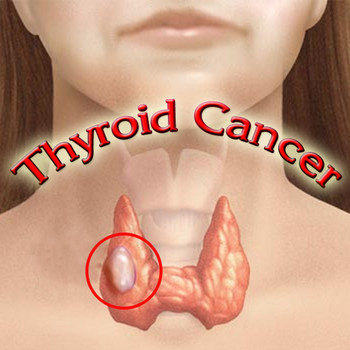 This occurs when the thyroid cells start to grow out of control and the cells change creating a tumor. A tumor is either benign, which means it is not cancerous, or malignant which means it is cancerous and can spread throughout the body.
This occurs when the thyroid cells start to grow out of control and the cells change creating a tumor. A tumor is either benign, which means it is not cancerous, or malignant which means it is cancerous and can spread throughout the body.
Symptoms of thyroid cancer are basically non-existent in the beginning but as the cancer grows it can cause the following:
- A large lump in your neck that you can feel through your skin
- Problems swallowing
- Lymph nodes that have become swollen
- Throat and neck pain
- Voice changes that include hoarseness
3. Hypoglycemia
 Hypoglycemia, as one of the diseases of the endocrine system, is probably best known as low blood sugar and happens when the blood glucose level is below normal. Glucose provides the body with energy and carbohydrates are a major source of glucose. Hypoglycemia usually only happens with diabetics.
Hypoglycemia, as one of the diseases of the endocrine system, is probably best known as low blood sugar and happens when the blood glucose level is below normal. Glucose provides the body with energy and carbohydrates are a major source of glucose. Hypoglycemia usually only happens with diabetics.
Symptoms of this condition include:
- Tiredness
- Anxiety
- Palpitations of the heart
- Skin that has become pale
- Sweating
- Irritability
- Sensation the makes a tingling around the mouth
- Pain while sleeping
As the condition gets worse the following are common:
- Seizures
- Blurry vision
- Confused behavior leaving patient unable to do simple tasks
- Unconsciousness
4. Metabolic Disorder
 Your metabolism takes the food you ingest and turns it into energy. A disorder happens when the process is disrupted by abnormal chemical reactions. The balance of the nutrients is off and some of your organs can suffer from the imbalance. One example of this disorder is diabetes.
Your metabolism takes the food you ingest and turns it into energy. A disorder happens when the process is disrupted by abnormal chemical reactions. The balance of the nutrients is off and some of your organs can suffer from the imbalance. One example of this disorder is diabetes.
Symptoms – There are few symptoms with a metabolic disorder. One sign is a big waistline. High blood sugar levels indicate diabetes which will result in blurred vision, an increase in thirst and urination, and unusual tiredness.
5. Adrenal Insufficiency (Addison's Disease)
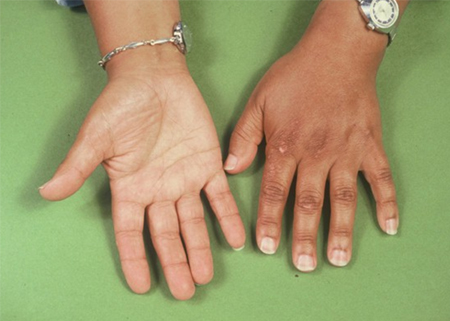 Addison's disease, another one of the diseases of the endocrine system, happens when there is not enough of cortisol or aldosterone. These hormones are produced by the adrenal glands.
Addison's disease, another one of the diseases of the endocrine system, happens when there is not enough of cortisol or aldosterone. These hormones are produced by the adrenal glands.
Symptoms of Addison’s disease include:
- Loss of weight and appetite
- Blood pressure that is low
- Fainting
- Craving salt
- Extreme tiredness
- Hyperpigmentation (skin becomes dark)
- Hypoglycemia (low blood sugar)
- Pain in the abdomen
- Vomiting, nausea, and diarrhea
- Pain in the joints and muscles
- Depression
- Sexual dysfunction in and loss of body hair
- Irritability
6. Cushing's Disease
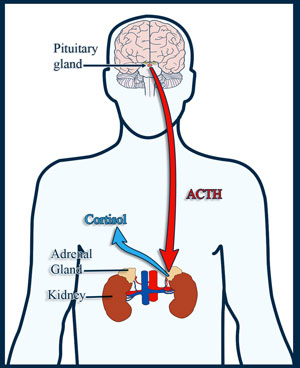 This condition is what happens when a pituitary gland produces too many hormones. The end result is an adrenal gland that is overactive.
This condition is what happens when a pituitary gland produces too many hormones. The end result is an adrenal gland that is overactive.
Symptoms – While the symptoms vary, changes in skin and increasing obesity are two of the common signs of this disease. Others include:
- Skin that has become thin, fragile and bruises right away
- Stretch marks on the breasts, arms, abdomen and thighs
- Deposits of fatty tissue along with weight gain in a number of places, including the face, upper back, between the shoulders, and around the middle of the body
- Cuts, infections and insect bites that heal slowly
- Breakouts on the skin
7. Polycystic Ovary Syndrome
This disease, also known as PCOS, has to do with the levels of a woman’s sex hormones being out of balance. When progesterone and hormone are off, it could result in ovarian cysts on the ovaries. It can also create problems with their fertility, menstrual cycle, appearance, and cardiac function.
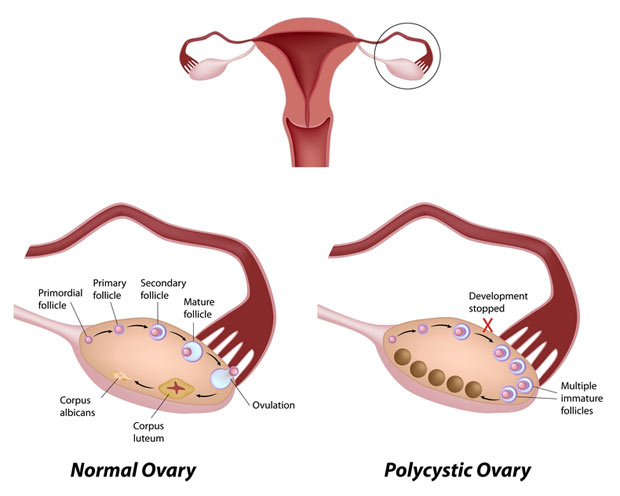
The symptoms start right after a woman starts her first period. Everyone is different and so is the way each woman reacts to PCOS. The one common symptom is menstrual cycles that are irregular.
With the low levels of the sex hormones in women with PCOS they tend to take on male features including:
- Smaller breasts
- Thinning hair
- A deeper voice
- Additional hair on the chest, face, and stomach
In addition, they may experience:
- Infertility
- Pain in the pelvic area
- Depression or anxiety
- Acne
- A gain in weight
8. Thyroiditis
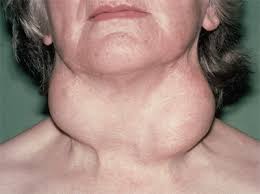 This is one of the diseases of the endocrine system that is considered a thyroid gland that is inflamed. Thyroiditis encompasses a collection of disorders that cause the inflammation of the thyroid but each in their own way. One of the most well-known types of this disease in the United States is called Hashimoto’s thyroiditis.
This is one of the diseases of the endocrine system that is considered a thyroid gland that is inflamed. Thyroiditis encompasses a collection of disorders that cause the inflammation of the thyroid but each in their own way. One of the most well-known types of this disease in the United States is called Hashimoto’s thyroiditis.
Another type of this disease can occur after a woman gives birth. Postpartum thyroiditis can cause high levels of the thyroid hormone in the blood called temporary thyrotoxicosis. This type of hypothyroidism is also temporary and is common after delivering a baby. One of the major causes of a painful thyroid is subacute thyroiditis. Another group that are susceptible to thyroiditis is drug users of amiodarone and interferon.
9. Other Diseases of Endocrine System
- Gigantism (acromegaly) and other growth hormone problems – Too much hormone production can make a child grow too quickly and too little can make a child stop growing.
- Hyperthyroidism – When a thyroid gland makes too much of the thyroid hormone it will result in loss of weight, sweating, an increased heart rate and nervousness. An overactive thyroid is usually caused from having Grave’s disease which is an autoimmune disease.
